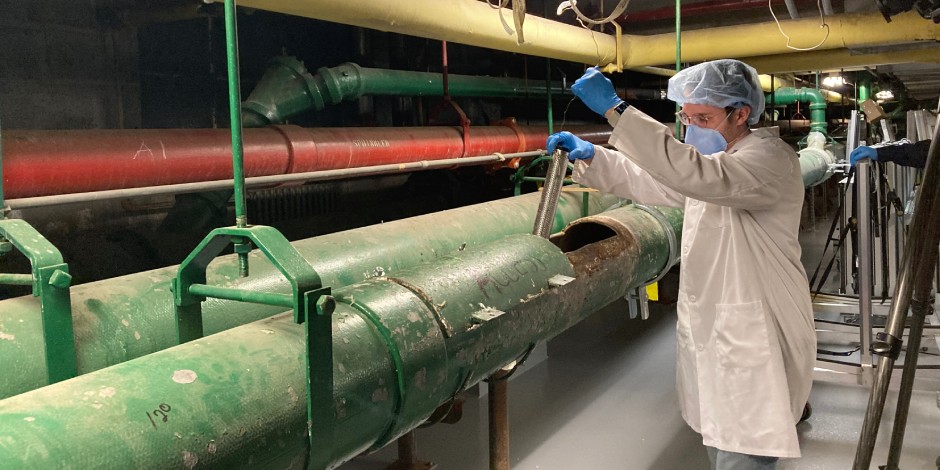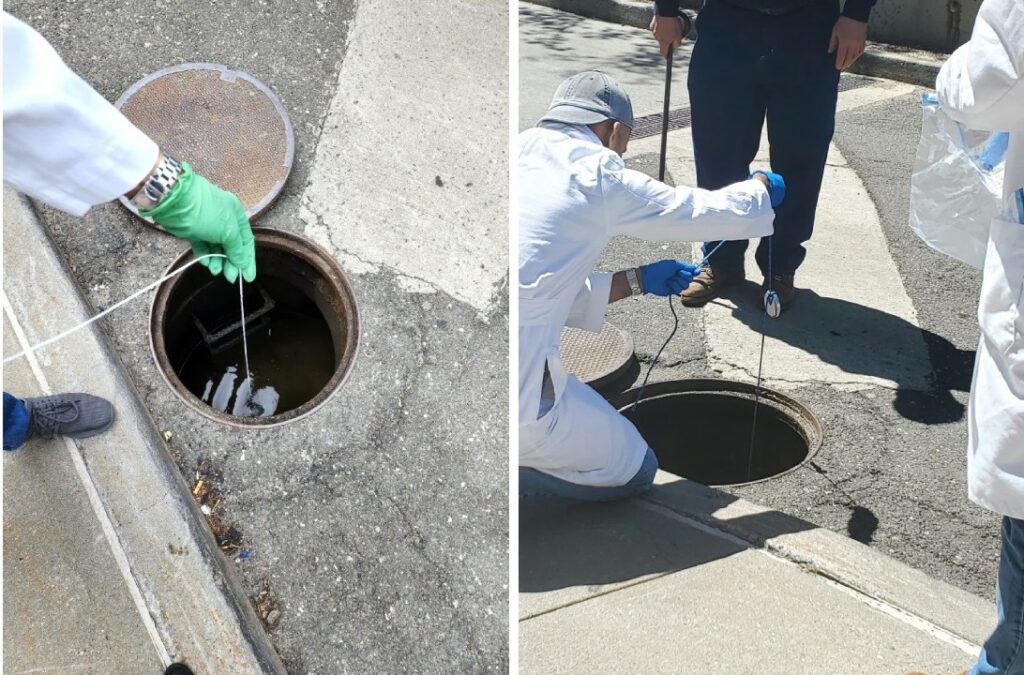NYC Health + Hospitals Announces Wastewater Surveillance Program at its 11 Hospitals
Wastewater data signals Covid and flu 10 to 14 days before those results are seen clinically at the hospital.
Next week, the health system will begin testing wastewater for monkeypox and polio
Aug 17, 2022

Queens College Research Assistant Justin Silbiger collects a wastewater sample from a sewage pipe in the basement of NYC Health + Hospitals/Elmhurst. (Credit: NYC Health + Hospitals)
NYC Health + Hospitals today announced its new Biosurveillance Program, which tests wastewater for infectious diseases. Launched in February at NYC Health + Hospitals/Elmhurst, the program has successfully predicted changes in Covid and flu rates 10 to 14 days before those results are seen clinically at the hospital. Starting next week, the program will expand to include testing for polio and monkeypox. Samples collected from hospital wastewater are tested by the Queens College CUNY Wastewater Epidemiology Laboratory (WETLAB) for the presence of Covid and flu and then tested by the Pandemic Response Laboratory for sequencing. Wastewater testing currently takes place at 10 of the system’s hospitals, and will be online at all 11 hospitals in the coming weeks.
“With the increase in rapid tests and the decline of federal funding for the Covid response this spring, wastewater testing was an affordable, easy way for us to track the presence of Covid in the community without needing patients to take a test,” said NYC Health + Hospitals President and CEO Mitchell Katz, MD. “Now, with the arrival of monkeypox and polio in New York City, we have a system in place to test for those viruses and use that data to inform our response.”
“Wastewater surveillance is a clever and novel way of getting valuable information about what’s coming,” said NYC Health + Hospitals Chair of Global Health Institute Joseph Masci, MD. “Wastewater data can give clinicians a 10- to 14-day head start on what we are seeing in clinical settings, and that can make a huge difference in prevention and treatment.”
“The team went above and beyond to put this program in place, from modifying access to sewage pipes to troubleshooting the design of the collection prototype,” said NYC Health + Hospitals Vice President, Clinical Services Operations Kenra Ford. “Having our wastewater surveillance infrastructure in place provides for an array of applications, and its use as a public health monitoring resource is invaluable.”
“The Queens College CUNY Wastewater Epidemiology Laboratory (WETLAB) is happy to support NYC Health + Hospital’s biosurveillance needs, especially at this time when our city is experiencing outbreaks of multiple emerging viruses,” said Queens College Biology Professor John Dennehy. “The WETLAB has developed a new method of concentrating viruses, which significantly reduces the cost and labor required to obtain virus genetic material and test for the presence of pathogens.”
“Tracking virus genomic sequences in wastewater provides vital disease prevalence information for community health, including those without direct access to healthcare,” said Jon Laurent, Vice President of Research and Development, Pandemic Response Lab. “With close to 100,000 COVID samples sequenced for epidemiological surveillance, we are proud to lend our sequencing capabilities to monitor other emerging infectious disease threats, such as monkeypox and polio, and to improve public health.”
Given the relatively small number of people who contribute to hospital wastewater, its data has consistently provided signals 10 to 14 days in advance of clinical test results. At the end of February, wastewater data indicated the presence of influenza two weeks before patients tested positive for it at the hospital. The week of April 20, wastewater showed double the viral load for Covid than it had the week before, a result seen clinically about 10 days later. In the middle of July, wastewater data showed a decrease in Covid, which was reflected in hospital patients toward the end of July.
The Biosurveillance program is a collaboration between NYC Health + Hospitals, CUNY, and the Pandemic Response Lab. Depending on the facility, researchers access wastewater from sewage pipes in the basement of the hospital or from a manhole on the hospital’s campus. CUNY researchers collect the wastewater samples, the CUNY Queens College Laboratory tests the samples for the presence of Covid and flu, and the Pandemic Response Laboratory sequences the samples.

About NYC Health + Hospitals:
NYC Health + Hospitals is the largest municipal health care system in the nation serving more than a million New Yorkers annually in more than 70 patient care locations across the city’s five boroughs. A robust network of outpatient, neighborhood-based primary and specialty care centers anchors care coordination with the system’s trauma centers, nursing homes, post-acute care centers, home care agency, and MetroPlus health plan—all supported by 11 essential hospitals. Its diverse workforce of more than 43,000 employees is uniquely focused on empowering New Yorkers, without exception, to live the healthiest life possible. For more information, visit www.nychealthandhospitals.org and stay connected on Facebook at https://www.facebook.com/NYCHealthandHospitals or Twitter at @NYCHealthSystem.
